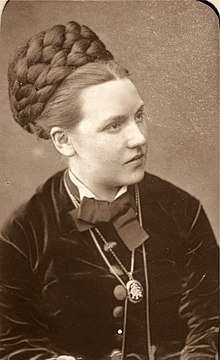Pauline Rita
Pauline Rita (c.1842 – 28 June 1920) was an English soprano and actress. During her early career, she was best known for her performances in operettas and comic operas at the Opera Comique and was associated with impresario Richard D'Oyly Carte. Later, she married flautist John Radcliff, and the two performed together for many years.

Biography
Oratorio and operetta
In 1872, Rita took part in a joint recital with Charles Santley at St James's Hall, London.[1] In the same year she sang in Handel's oratorio Athalia in Glasgow, where the local critic was unimpressed: "Mdlle. Rita has a voice nearly always in tune, but of a shrill and unsympathetic quality, and she indulges from time to time in that fatal vibrato to which we have so often objected."[2] In 1874, she performed in Richard D'Oyly Carte's light opera company at the Opera Comique, in The Broken Branch, an English version of Gaston Serpette's La branch cassée, in which she received better notices: "Madame Pauline Rita has achieved a triumph in her first appearance on the stage. She possesses a voice of singular flexibility, acts well, and looks attractive."[3] In December 1874 she played the lead role of the Prince de Conti in Charles Lecocq's Les Prés St. Gervais at the Criterion Theatre.[4] The following year, she starred in the title role, Clairette Angot, in a revival of Lecocq's La fille de Madame Angot at the Opera Comique, which replaced La Périchole on the bill with Trial by Jury.[5] In October of that year she appeared as Barbara in Alfred Cellier's The Tower of London at the Prince's Theatre, Manchester.[6]
In January 1876 at the Royalty Theatre, she appeared under Carte's management as Gustave Muller in The Duke's Daughter.[7] On 5 May 1876, Rita was the beneficiary of a special matinée at the Princess's Theatre at which Selina Dolaro, Mrs. Howard Paul, Arthur Cecil and many others contributed, and Alfred Cellier conducted his operetta Dora's Dream.[8] That summer, she repeated her roles of Gustave Miller and also played the Plaintiff in Trial by Jury on tour with Carte's Opera Bouffe Company (with Carte himself as musical director).[7] In 1877, at a benefit performance for Henry Compton, described by The Era as "undeniably the greatest event known in the annals of the Stage", Rita played the Plaintiff in a star-studded performance of Trial by Jury, conducted by Arthur Sullivan, with W. S. Gilbert as the Associate, Arthur Cecil as the Usher, W. H. Cummings as the Defendant, and famous performers such as George Grossmith, W. S. Penley, Kate Bishop and Marion Terry in the chorus.[9]
Apart from the Plaintiff, Rita played two Gilbert and Sullivan roles – one for D'Oyly Carte and one not. She played Aline in The Sorcerer on tour in Liverpool in March 1878, and in September 1879 she played Josephine in H.M.S. Pinafore in the production mounted by Carte's former partners in the Comedy Opera Company after he had separated from them. She never returned to D'Oyly Carte management.[7][10] During the late 1870s, Rita performed with Charles Morton's opera company at the Opera Comique.[11]
Later years
In 1881, Rita's voice suffered from overwork, and she moved to Australia to rest and stay with family.[12] In January 1884, she married the celebrated flautist, John Radcliff (1842–1917), to whom she had become engaged in London in 1881. Together, they organised a successful three-year tour through Australia and New Zealand in 1884–86.[13][14] Returning to Britain, they continued to give the programme they had perfected on tour: "Flutes of All Ages: Mr Radcliff ... playing on twenty different instruments selections from the music of all countries and all times. The entertainment was varied by songs, rendered with finished vocal ability, by Madame Pauline Rita."[15] They then developed this show as Pan to Pinafore and presented it around Britain for several years with great success.[16]
Rita undertook some vocal teaching, her success being noted in the press.[17] In later years, she became blind.[18] She died at her home in Kensington, London, after a long illness.[13]
Notes
- Daily News, 22 May 1872, p. 3
- Glasgow Herald, 23 October 1872, p. 4
- The Graphic, 29 August 1874, p. 211; also The Pall Mall Gazette, 29 August 1874, p. 11: "Mdme Pauline Rita has in her part a very pretty 'vocal waltz', which she executes with all possible neatness and fluency."
- The Graphic, 5 December 1874, p. 546
- Fitz-Gerald, S. J. Adair. The Story of the Savoy Opera, p. 12, D. Appleton and Company (1925)
- Manchester Weekly Times, 9 October 1875, p. 4
- Stone, David. Pauline Rita at Who was Who in the D'Oyly Carte Opera Company, 27 August 2001, accessed 7 June 2009
- The Era, 7 May 1876, p. 14
- The Era, 4 March 1877, p. 6
- Rollins and Witts, pp. 29 and 6; The Era, 7 September 1879, p. 6
- Henry Chance Newton (1905). Sixty years' stage service: being a record of the life of Charles Morton, "The father of the halls.". Gale and Polden, Ltd. p. 122.
- Leonardo De Lorenzo (1992). My Complete Story of the Flute: The Instrument, the Performer, the Music. Texas Tech University Press. p. 153. ISBN 978-0-89672-277-4.
- The Times Obituary, 26 July 1920, p. 16
- The Era, 17 January 1885, p. 17, and 8 May 1886, p. 6
- The Era, 25 December 1886, p. 17
- The Era, 7 July 1888, p. 7; The Bristol Mercury and Daily Post, 8 January 1890; Jackson's Oxford Journal, 20 February 20, 1892
- The Penny Illustrated Paper and Illustrated Times, 8 September 1894, p. 156
- The Musical Times. Novello. 1917. p. 160.
References
- J. M. Glover (1913). Jimmy Glover and His Friends (2008 ed.). Read Books. p. 115. ISBN 978-1-4086-8221-0.
- Cyril Rollins; R. John Witts (1966). The D'Oyly Carte Opera Company in Gilbert and Sullivan Operas: A Record of Productions, 1961-1966. Supplement, Compiled by Cyril Rollins and R. John Witts.